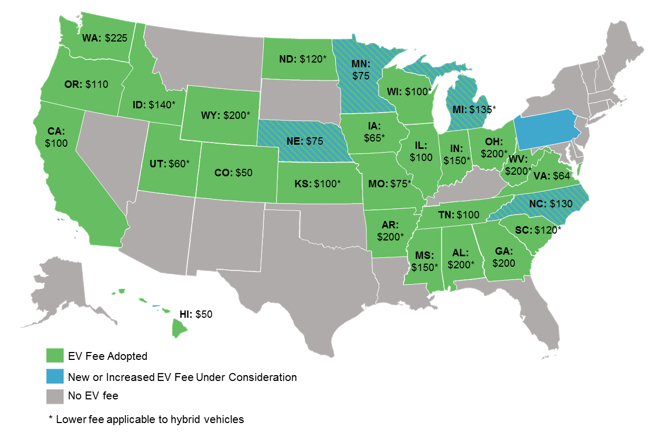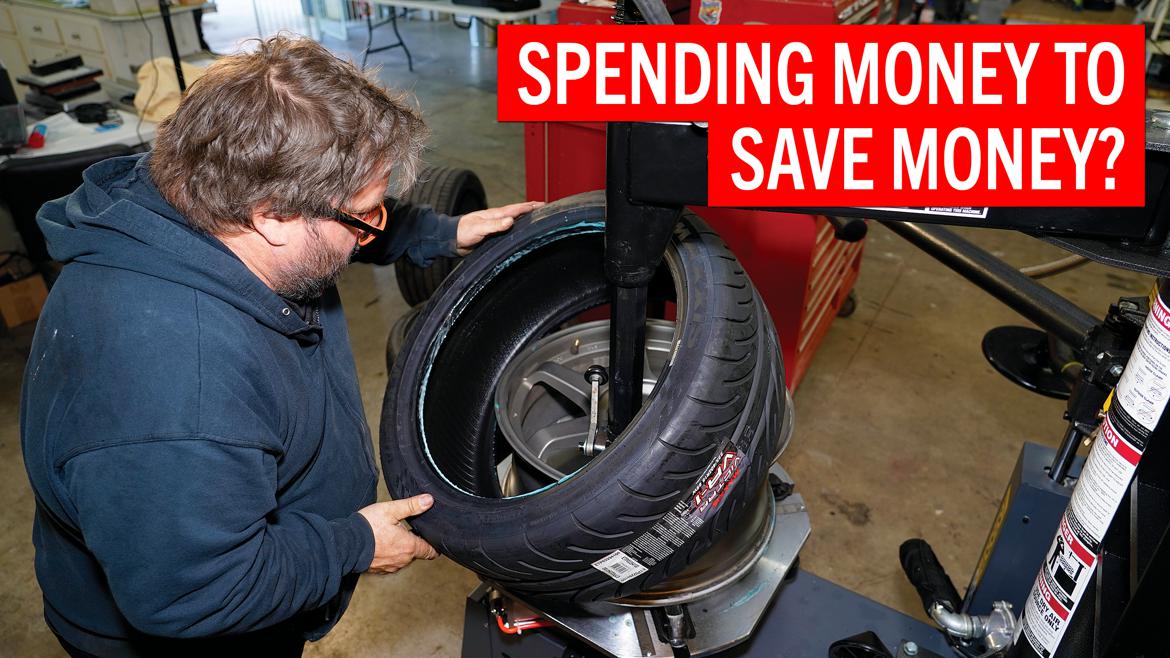
*puts down blunt that I was sharing with Elon Musk and puts on tinfoil hat*
The EVs are going to save the ICE racecar. But it's going to happen via a method that everyone is seemingly resistant to (even if it benefits them, which it would benefit 30-40% of people and likely people who drive thirsty vehicles or have vehicles that see very low mileage use. Eventually, and fairly reluctantly, as a nation we're going to move away from gas taxes and towards highway use taxes. This will obviously occur as fuel consumption goes down per a highway mile traveled.
What you'll likely see occur is mileage checks, which when and if that occurs, it would be easier to prove limited use of a race or pleasure vehicle with a annual mileage cap allowing for a potential EPA regulation exemption for the vehicle. If I were SEMA, that's the angle I'd be approaching and I'd be enlisting the support of Haggerty. I'd hope to 2500-3000 miles for the exemption, so I'd start by asking for 4,000 miles as the ceiling.

captdownshift (Forum Supporter) said:
*puts down blunt that I was sharing with Elon Musk and puts on tinfoil hat*
The EVs are going to save the ICE racecar. But it's going to happen via a method that everyone is seemingly resistant to (even if it benefits them, which it would benefit 30-40% of people and likely people who drive thirsty vehicles or have vehicles that see very low mileage use. Eventually, and fairly reluctantly, as a nation we're going to move away from gas taxes and towards highway use taxes. This will obviously occur as fuel consumption goes down per a highway mile traveled.
What you'll likely see occur is mileage checks, which when and if that occurs, it would be easier to prove limited use of a race or pleasure vehicle with a annual mileage cap allowing for a potential EPA regulation exemption for the vehicle. If I were SEMA, that's the angle I'd be approaching and I'd be enlisting the support of Haggerty. I'd hope to 2500-3000 miles for the exemption, so I'd start by asking for 4,000 miles as the ceiling.
This just encourages me to buy more cars so I can't drive them enough to pass the ceiling.
In reply to iansane :
I see no downside to that. 
In reply to iansane :
I was up to 5 earlier in the year and the property tax bill was no fun. The government will get their money, one way or another.
captdownshift (Forum Supporter) said:
What you'll likely see occur is mileage checks, which when and if that occurs, it would be easier to prove limited use of a race or pleasure vehicle with a annual mileage cap allowing for a potential EPA regulation exemption for the vehicle. If I were SEMA, that's the angle I'd be approaching and I'd be enlisting the support of Haggerty. I'd hope to 2500-3000 miles for the exemption, so I'd start by asking for 4,000 miles as the ceiling.
There's two different "limited use" catagories in Virginia (25 year+ antique, and "pre-'49 antique & kits/replica") that both have limits of 5,000 miles. Main difference being the first also includes a limit on "only going to/from car events"... whereas the other doesn't have that stipulation. So, there's some(?) precedence of that being a "reasonable" limit to prove "limited use". ymmv

STM317
UberDork
11/11/21 5:15 a.m.
captdownshift (Forum Supporter) said:
*puts down blunt that I was sharing with Elon Musk and puts on tinfoil hat*
The EVs are going to save the ICE racecar. But it's going to happen via a method that everyone is seemingly resistant to (even if it benefits them, which it would benefit 30-40% of people and likely people who drive thirsty vehicles or have vehicles that see very low mileage use. Eventually, and fairly reluctantly, as a nation we're going to move away from gas taxes and towards highway use taxes. This will obviously occur as fuel consumption goes down per a highway mile traveled.
What you'll likely see occur is mileage checks, which when and if that occurs, it would be easier to prove limited use of a race or pleasure vehicle with a annual mileage cap allowing for a potential EPA regulation exemption for the vehicle. If I were SEMA, that's the angle I'd be approaching and I'd be enlisting the support of Haggerty. I'd hope to 2500-3000 miles for the exemption, so I'd start by asking for 4,000 miles as the ceiling.
Wouldn't it be easier to just charge a flat fee each year for every vehicle registered for road use? Much less enforcement to deal with. Vary the fee depending on vehicle type, and what you want to incentivize people to drive.
In reply to STM317 :
That doesn't make sense from a road use standpoint. The general idea with a fuel tax, that is mostly self-regulating, is that vehicles that use more fuel cause more wear and damage to public roads.
That is how some road use fees work, though. I know that our heavier vehicles cost more to register than the lighter ones and it's surprisingly granular. And the electric has a $50 surcharge because it's not using gas.

Pete. (l33t FS) said:
In reply to STM317 :
That doesn't make sense from a road use standpoint. The general idea with a fuel tax, that is mostly self-regulating, is that vehicles that use more fuel cause more wear and damage to public roads.
I think that's more of a happy coincidence than a guiding principle. Milage checks are going to require a huge infrastructure, generate a lot of resistance due to privacy concerns, and create incentives for people to figure out ways to cheat them.
If they really want to continue to tie it to usage, the easier way is to make it a supplementary tax on the charging bill. Doing that on commercial charging stations is easy, and for home charging you set it up so that after such and such date any charger sold has to contain a smart meter that reports the total charging usage back to the electric company who adds the tax to your monthly electric bill.
I think it's more likely though that they'll give up on the usage-based method and just get the revenue through increasing other tax sources. Registration fees perhaps, or just a general tax increase.
In reply to codrus (Forum Supporter) :
There are already ways around that as well. If you have a solar setup that charges batteries to be able to use as a battery backup you then could use the batteries to charge the vehicle without having it hooked in, via adapter, so that you wouldn't be charging the vehicle from the live power output.
It will end up being mileage checks. And it will not take all that long or be all that difficult to do. It will take less time than yearly emissions checks or biyearly safety inspections already do. Every time a vehicle is serviced, The mileage is recorded and it takes less than 30 seconds. If you need federal employees to do it, as opposed to certifying shops or other locations to do so, the good news is is there's a post office in your zip code.

STM317
UberDork
11/11/21 9:47 a.m.
Pete. (l33t FS) said:
In reply to STM317 :
That doesn't make sense from a road use standpoint. The general idea with a fuel tax, that is mostly self-regulating, is that vehicles that use more fuel cause more wear and damage to public roads.
It's already done that way with EVs in many states though. Since EVs pay no fuel tax, they're charged a flat fee to offset the lost tax revenue. PHEVs are charged a smaller flat fee. Doesn't matter how much they're driven, they all pay the same. In a few cases, the annual fee can be $200 or more, which is likely more than a similar vehicle would generate in fuel taxes anyway:

If weight is the concern, then charge larger, heavier vehicles more, and see just how much people really want to own/operate massive vehicles.
How much road damage is realistically done by a 4500lb CUV when commercial stuff routinely cruises around weighing 20k-80k lbs all day, every day?

STM317
UberDork
11/11/21 9:53 a.m.
captdownshift (Forum Supporter) said:
It will end up being mileage checks. And it will not take all that long or be all that difficult to do. It will take less time than yearly emissions checks or biyearly safety inspections already do.
Many states don't currently do these things. Plenty of states have no inspections of any kind. That's where the higher infrastructure costs come in
In reply to STM317 :
I can't speak for other states, but Ohio has no requirement that vehicles have working odometers. (Or speedometers) And there are no vehicle inspections anyway, just emissions testing in certain counties, which is a plug-in-and-done deal. There are even self-service kiosks for this.
In reply to STM317 :
Even in states that don't have these things, I don't see where any added infrastructure cost comes in. If all you need is a federal employee or certified licensed federal contractor to verify the mileage once a year, it can be done at a post office in less than 5 minutes.
There no additional infrastructure needed, outside of a computer server to host the database of information. You're attempting to envision roadblocks where there are none.

STM317
UberDork
11/11/21 11:45 a.m.
In reply to captdownshift (Forum Supporter) :
This is becoming a weird tangent for a thread about increased crackdowns on aftermarket vendors for emissions loopholes but I'll indulge a bit...
Google tells me there are about 275 million vehicles registered in the US each year. At 5 minutes per vehicle to randomly inspect, that's 1.375 billion minutes (22.91666 million hrs) each year that postal workers or other government employees are now supposed to spend checking out vehicles? That's less productivity and/or more staffing which means costs go up.
If they're going to do mileage confirmation, wouldn't it make more sense to do it at the DMV at the time of registration? But isn't registration often handled online now? I haven't been in a DMV in years. And now I'd have to take every vehicle that I have registered in separately too? What a pointless hassle. You're talking about everybody needing to drive every registered vehicle to the testing location (whatever that may be) instead of just filling out an online form for all of them at the same time. That means longer waits, in much busier DMVs/Post offices/Whatever.
It just seems way more complex to me than it needs to be. Everybody already registers their vehicles. This can be done remotely to save everybody time and money while being better for the environment as well. Add a fee based on the vehicle and be done with it. Hell, I'd pay a bit more in an annual fee than I otherwise would just to avoid the hassle of having to take an entire day of my life shuttling vehicles around and waiting in lines.
captdownshift (Forum Supporter) said:
Even in states that don't have these things, I don't see where any added infrastructure cost comes in. If all you need is a federal employee or certified licensed federal contractor to verify the mileage once a year, it can be done at a post office in less than 5 minutes.
Have you seen the line at the post office lately?
Here in CA our smog checks are every 2 years, not every year, and they don't start until the vehicle is about 8 years old.
captdownshift (Forum Supporter) said:
There are already ways around that as well. If you have a solar setup that charges batteries to be able to use as a battery backup you then could use the batteries to charge the vehicle without having it hooked in, via adapter, so that you wouldn't be charging the vehicle from the live power output.
The "charger" that you plug into the car still sees the current going in and can report it.
Manual odometer checking every vehicle in the US every year just isn't practical, all of the proposals I've seen have been electronic.

captdownshift (Forum Supporter) said:
In reply to codrus (Forum Supporter) :
There are already ways around that as well. If you have a solar setup that charges batteries to be able to use as a battery backup you then could use the batteries to charge the vehicle without having it hooked in, via adapter, so that you wouldn't be charging the vehicle from the live power output.
It will end up being mileage checks. And it will not take all that long or be all that difficult to do. It will take less time than yearly emissions checks or biyearly safety inspections already do. Every time a vehicle is serviced, The mileage is recorded and it takes less than 30 seconds. If you need federal employees to do it, as opposed to certifying shops or other locations to do so, the good news is is there's a post office in your zip code.
It's easier than all that and just as likely. Look at a new car, look at how it brags about being "connected", look at how it boasts "over-the-air-whatever" and huge 12 sq. in windows. Odometer reading will, optionally of course for the .01% of people that don't choose the easy way, be vehicle self-reported to the regulating bodies and the accompanying tax applied to your Tencent wallet.

Man, what a bunch of pessimists on this board.
I very much don't see a new law requiring 100% inspections. Mostly because that's 100% outside of the domain of the EPA- it's all in the domain of the states. And the ONLY way they would possibly do that would be because they are in violation of clean air standards.
I see what's going on WRT new emissions, and once we hit SULEV30 as the fleet average, then robustness requirements will be increased. Which is actually good for all of us- it will make cars run better in more situations. The only part that you *might* notice, very briefly is within the first 20 seconds of a cold start.
The laws that are all over this thread have been on the books for as long as I am more aware of the law, and I know of anti-tampering laws baked in to the original clean air act. Again, what *really* happened is 1) VW and 2) a portion of the enthusiast market were taking obviously tampered vehicles out and then showing off they were tampered. And since you can't bias the enforcement of laws to specific groups or companies, everyone got caught up in the enforcement.
WE, as an enthusiast group, could not police ourselves, when we were pretty much given the ability to do that.
That's the thing that annoys me, WE are to blame but many want to point fingers. Without a real race car or limited use carve out passed the grey zone is wide and annoying. I have had customers send pictures of "non reversable/race specific" modifications (roll cages, slicks, empty interiors, lexan, etc) to try and document the exclusive non-road use when possible.
I have a road registered vehicle with a roll cage, R compound tires, an empty interior and a Lexan rear window. Just sayin'.








































